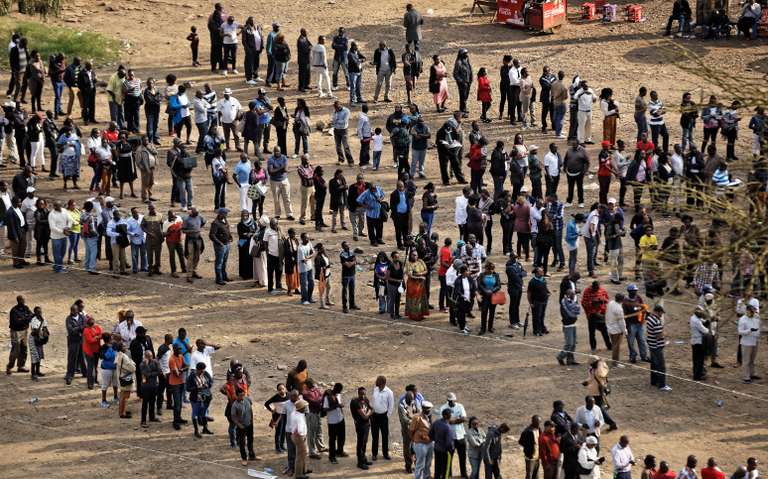Two years after it began, the so-called “Anglophone crisis” continues to rage in the North-West and South-West regions (collectively known as “NoSo”) of Cameroon. Over time, the situation has deteriorated to the point of becoming an armed conflict pitting the Cameroonian Armed Forces against the Ambazonian Defence Forces. Continuing into 2018, an election year, without any improvement in the situation in the Anglophone part of Cameroon, there is reason to fear that, following the outcome of the ballot of 7 October, the division of Cameroon will be finally decided.
Challenging the Legitimacy of the Central Government
At a time when Anglophone activists are throwing themselves into the battle against the central authority, the goal is clearly to challenge its legitimacy. They believe that “the Republic” is unlawfully occupying their territory and furthermore is attempting to assimilate them culturally by imposing French at all levels of government.
In efforts to challenge Yaoundé’s legitimacy, “ghost towns”, days during which no economic activity is conducted, were instituted by the Consortium which was then the decision-making body and was leading the unarmed struggle. At the time, given that a large proportion of the country’s resources come from the Anglophone regions, the goal of the Consortium was manifestly to economically undermine the central government for the purpose of establishing negotiations on the form of the State.
Matters did not go as planned, with the banning of the Consortium and the arrest of its leaders, and on top of that, internet was suspended in the two Anglophone regions for 93 days. As a result, several more violent protest groups were formed which are no longer content simply to engage in the ghost towns strategy.
Making Ambazonia ungovernable
The decapitation of the Consortium and the arrest of certain activist leaders of the protest movements such as Mancho Bibixi has had the opposite effect from that expected by the Yaoundé authorities. Instead of permanently stamping out the rebellion, multiple more or less independent and more radical small groups have been springing up and have begun to attack anything representing the Francophone authority in Ambazonian territory, hesitantly at first, but then with extreme violence.
Men in uniform are being killed, sub-prefects, commissioners, mayors, etc. being threatened, abducted… The goal is to make the Anglophone regions of the country ungovernable, a sign that the Francophone authority of “the Republic” is no longer respected and does not therefore have legitimacy. The consequences are dire, and it is the general populace which is suffering the most. But the strategy is working. Now civil servants are deserting their posts, schools remain closed and in some places, foreigners (and even people indigenous to the area) are choosing to flee the region.
All celebrations or demonstrations organized by the authorities of “the Republic” are being boycotted. On 19 May this year, a mayor and his deputy were abducted for having called upon citizens to take part in the parade of 20 May, when the celebration of national unity takes place. And it is against this same background that the election of 7 October will be held. Already, messages are appearing on social media stating that there will be no election in the Anglophone regions of the country.
The Impossibility of Holding the Election in NoSo
The Central Government is facing a dilemma in this election year: should the presidential election be postponed, given the prevailing context? That would probably have been the best thing to do, except for the fact that it would be an admission of failure to manage a crisis that the Government’s spokespersons claim to have under control. The Central Government has therefore opted to hold the election, despite the unstable security situation. But can this election actually take place?
Observation of the events of the past weeks clearly shows that the people, either because they are supporters or for fear of reprisals, are complying with the orders issued by the secessionist groups which control certain areas of the North-West and South-West regions. This raises fears that, when it comes to it, the election will not take place in these two regions, or at least there will be a very low turnout, given that the army will not be able to guarantee the safety of the voters during and particularly after the ballot.
No Election or the Partition of Cameroon
If the election does not take place in NoSo as a number of analysts predict, would this not be an indication that Anglophone Cameroon has well and truly become Ambazonia, i.e., a state finally liberated from the authority of “the Republic”? If the compatriots of Anglophone Cameroon do not participate in the choice of the next President, what legitimacy will he have in these regions?
We are witnessing a gradual shift towards the “victory” of the secessionists who, in barely two years, will have succeeded in making the two Anglophone regions ungovernable, thereby challenging the very legitimacy of the Yaoundé government. There is reason to fear that if, following the result of 7 October 2018, no handover of power or negotiations take place, the North-West and the South-West regions will remain permanently cut off from the rest of the country.



